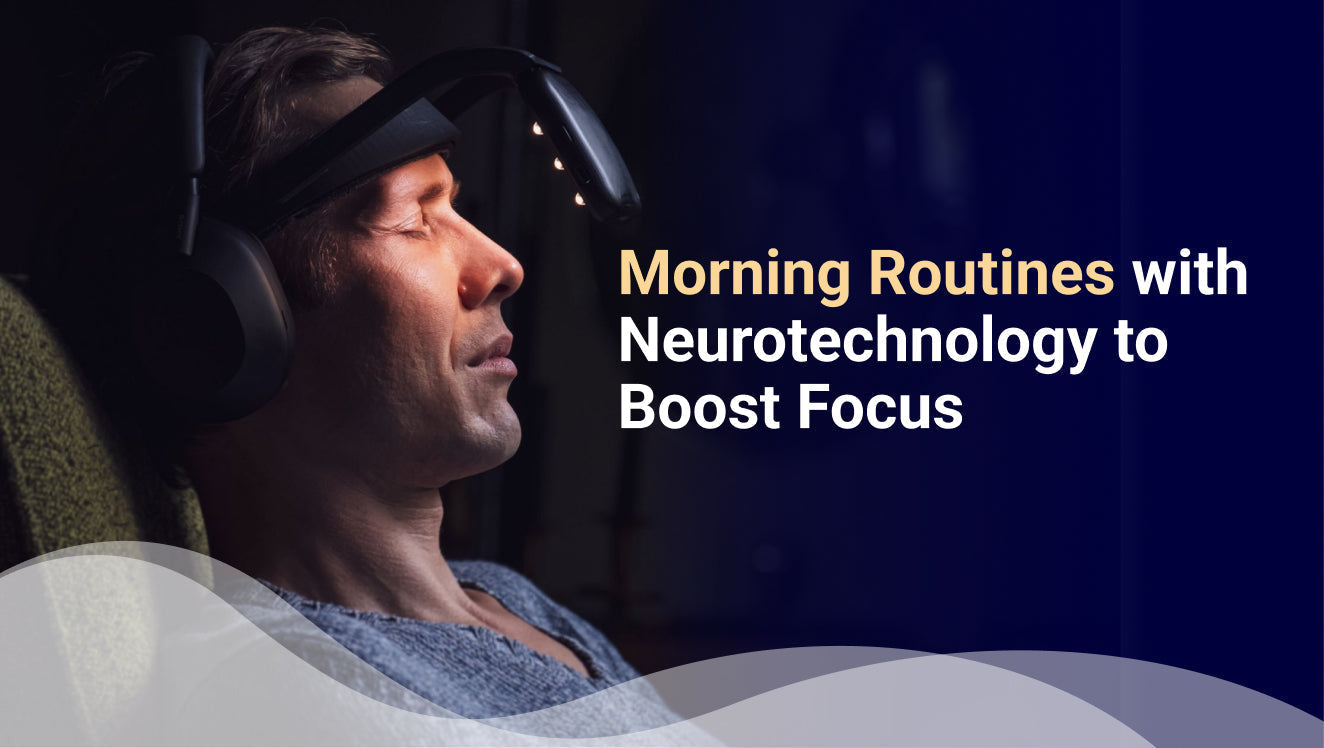Staying focused is harder than ever. Between constant notifications, stress, and busy schedules, it’s easy for the brain to feel scattered. Yet research shows that morning routines can reduce stress by 25% and improve mental clarity (CNBC, 2022). For students, entrepreneurs, athletes, and creatives, mornings aren’t just about starting the day they’re about shaping focus and resilience.
For example, eating a balanced breakfast within two hours of waking stabilises blood sugar, directly boosting attention (Medical News Today, 2024). Many high performers are now turning to neurotechnology tools like neuroVIZR to prime their brains with light and sound, improving adaptability, focus, and mental energy (Townsend Letter, 2023).
This blog explores:
-
How neurotechnology fits into morning routines
-
The habits high performers use to stay sharp
-
Step-by-step ways to build your own focus-boosting routine
Why Move Your Body Early in the Day?
Why it works: Exercise increases oxygen to the brain and raises Brain-Derived Neurotrophic Factor (BDNF), a protein that strengthens neural connections essential for learning and focus.
Science says: A study found that just 20 minutes of intense exercise can boost memory by increasing BDNF levels. Exercise is a simple, powerful way to prime the brain.
How to do it: Start your morning routine with a jog, yoga, or a HIIT workout.
Pro tip: Do it in morning sunlight to reset your body clock and reinforce focus. 10-minute daily habits to improve memory and retention.
Can Mindfulness Really Sharpen Focus?
Why it works: Mindfulness reduces activity in the amygdala (the brain’s stress centre) while strengthening the prefrontal cortex, which governs focus, reasoning, and self-control.
Science says: A two-week mindfulness training improved working memory by 16 percentile points (Medical News Today, 2017).
How to do it: Sit comfortably, close your eyes, and practice slow breathing: inhale for 4 seconds, hold for 4, exhale for 6.
Pro tip: Add a 5-minute guided meditation to ease in especially helpful for students before study sessions.
What Role Does Nutrition Play in Morning Focus?
Why it works: Breakfast choices directly affect mental energy. A meal rich in protein, healthy fats, and antioxidants fuels the brain and prevents energy crashes.
Science says: Omega-3 fatty acids (found in walnuts and salmon) improve memory, while antioxidants in berries protect brain cells. Stable blood sugar also prevents dips in attention.
How to do it: Try oatmeal with walnuts and blueberries, or eggs with avocado toast.
Pro tip: Swap coffee for green tea the combination of caffeine and L-theanine supports smoother, longer-lasting focus.
How Can neuroVIZR Prime the Brain?
Why it works: Neurotechnology tools like neuroVIZR brain training devices use light and sound to support neuroplasticity (the brain’s ability to adapt and form new connections). This makes it easier to shift into a focused state quickly.
Science says: Audio-Visual Entrainment (AVE) devices have been shown to improve heart rate variability (HRV) by 10%, a marker of resilience and readiness (Townsend Letter, 2023).
How to do it: Open the neuroVIZR app, select a “Focus” session, close your eyes, and allow the pulsing light and sound patterns to guide your brain.
Pro tip: Use neuroVIZR daily as part of your morning routine it only takes a few minutes and provides a reliable mental edge. Your neuroVIZR experience: Brain Prime & Brain Time.
What Do High Performers Do Differently?
Top leaders and athletes use mornings to train focus:
-
Richard Branson starts with exercise to fuel productivity.
-
Arianna Huffington avoids screens early to protect attention.
-
LeBron James uses morning visualisation before training.
-
Jeff Bezos makes key decisions only after completing his morning routine.
Research shows 90% of highly productive people rely on structured routines to protect focus (CNBC, 2022). Adding tools like neuroVIZR strengthens these already proven habits.
How Do You Build Your Own Focus Routine?
Why it works: Habits form through repetition. Research shows that 66 days of practice can make behaviours automatic (Lally et al., 2009). Consistency is the key to lasting focus.
How to do it:
-
Start with 5–10 minutes of movement.
-
Add 5 minutes of mindfulness or journaling.
-
Eat a brain-friendly breakfast.
-
Use neuroVIZR to prime your brain for focus.
Pro tip: Track your daily energy and focus levels. Adjust your routine until it feels natural.
Final Thoughts: Training Focus Is a Daily Choice
Focus is not accidental it’s trained. High performers use exercise, mindfulness, nutrition, and neurotechnology as anchors in their mornings to stay sharp.
neuroVIZR makes focus more accessible by guiding your brain into alert, resilient states in minutes. Combined with natural habits, it helps build a routine that supports memory, clarity, and learning.
Start small, stay consistent, and notice how your focus and energy improve each morning.
References
-
CNBC. (2022). Psychologists: Morning habits to help you be happier, more productive.
-
Medical News Today. (2024). What to eat in the morning.
-
Medical News Today. (2017). How 20 minutes of intense exercise can boost memory.
-
Townsend Letter. (2023). neuroVIZR executive summary.
-
Lally, P., et al. (2009). How are habits formed: Modelling habit formation in the real world. European Journal of Social Psychology, 40(6), 998–1009.



























Partager:
Morning Routines with Neurotechnology to Boost Study Focus
Sleep and Ageing: How to Improve Sleep Quality in Older Adults